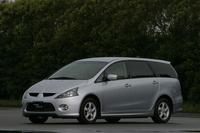Mitsubishi Motors To Begin Fuel Cell Vehicle Test This Year - Plus Company Press Release
TOKYO September 17, 2003; Dow Jones reported that Mitsubishi Motors Corp. said Wednesday it has developed a fuel cell vehicle to run on public roads for verification testing for the first time and plans to begin tests by the end of the year.
Mitsubishi lags other Japanese automakers in fuel-cell vehicle development. Toyota Motor Corp. and Honda Motor Co. started leasing their fuel cell vehicles late last year, while Nissan Motor Co. also plans to lease its fuel cell vehicles by the end of the year.
Global auto makers are stepping up efforts to develop the green technology as they seek to lure environmentally-conscious customers. Fuel cell vehicles are powered by electricity generated from hydrogen, which has high energy density for its weight and generates no toxic exhaust gases.
In the latest alliance with DaimlerChrysler AG , Mitsubishi is using a fuel cell system developed by its German-American parent company.
Mitsubishi Motors has installed DaimlerChrysler's fuel-cell system in its " Grandis" minivan, said Hiromitsu Ando, an executive office of Mitsubishi Motors' research and development office.
"We're not considering leasing" our fuel cell vehicles anytime soon, Ando said, as "only a limited number of customers can provide hydrogen on their own" at present.
Ando said his company is seeking to develop a variety of types of fuel cell vehicles to gain more advanced technology, hoping to develop a fuel cell powered small car after the minivan model.
Mitsubishi Motors initially began development of fuel cell technology with Mitsubishi Heavy Industries Ltd.in the late 1990's. Their development was focused on a methanol reformer type of a fuel cell system. However, the automaker decided in 2002 to switch to a hydrogen storage type of fuel cell technology that other auto makers including DaimlerChrysler had been developing.
Mitsubishi Motors said it has applied to the Ministry of Land, Infrastructure and Transport for vehicle type certification in a bid to take part in the Japan Hydrogen & Fuel Cell Demonstration Project funded by the government.
It will provide data that it gains from the testing on public roads to the project.
Mitsubishi Motors press release:
Mitsubishi Motors Corporation (MMC) today announced the development of the MITSUBISHI FCV fuel-cell vehicle, a Mitsubishi Grandis minivan powered by DaimlerChryslerís FC-System. MMC applied for Ministry of Land, Infrastructure and Transport vehicle type certification in order to participate in the Japan Hydrogen & Fuel Cell Demonstration Project (JHFC Project) funded by Japanís Ministry of Economy, Trade and Industry
Mitsubishi Motors Corporation (MMC) today announced the development of the MITSUBISHI FCV fuel-cell vehicle, a Mitsubishi Grandis minivan powered by DaimlerChryslerís FC-System. MMC applied for Ministry of Land, Infrastructure and Transport vehicle type certification in order to participate in the Japan Hydrogen & Fuel Cell Demonstration Project (JHFC Project) funded by Japanís Ministry of Economy, Trade and Industry.
Exploiting the benefits of its alliance with DaimlerChrysler to maximum advantage, MMC decided to use DaimlerChryslerís very latest fuel-cell system, which employs Ballard Power Systemís fuel cell stack and power module, to power the MITSUBISHI FCV.
Participation in the JHFC Project will enable MMC to subject the MITSUBISHI FCV to verification testing under actual driving conditions on public roads, using hydrogen refueling stations that supply hydrogen produced in a number of different ways. Enabling the company to add primary data about on-road vehicle and environmental performance and safety to its FCV technology stockpile, the testing marks the first step towards the application of this technology in a Mitsubishi production vehicle.
MMC chose the Grandis, its recently launched stylish minivan, as the global market for minivans continues to grow in both size and importance. The selection of its newest main model, which will be launched in Europe and other overseas markets in 2004, also demonstrates the companyís commitment to building environmentally friendly cars capable of carrying more passengers than small cars to further reduce pollution.
The JHFC Project aims to bring fuel cell technology to commercialization by fostering close cooperation between vehicle manufacturers, energy supply companies and government agencies to test fuel-cell vehicles together with the required hydrogen fueling infrastructure under normal operating conditions.



